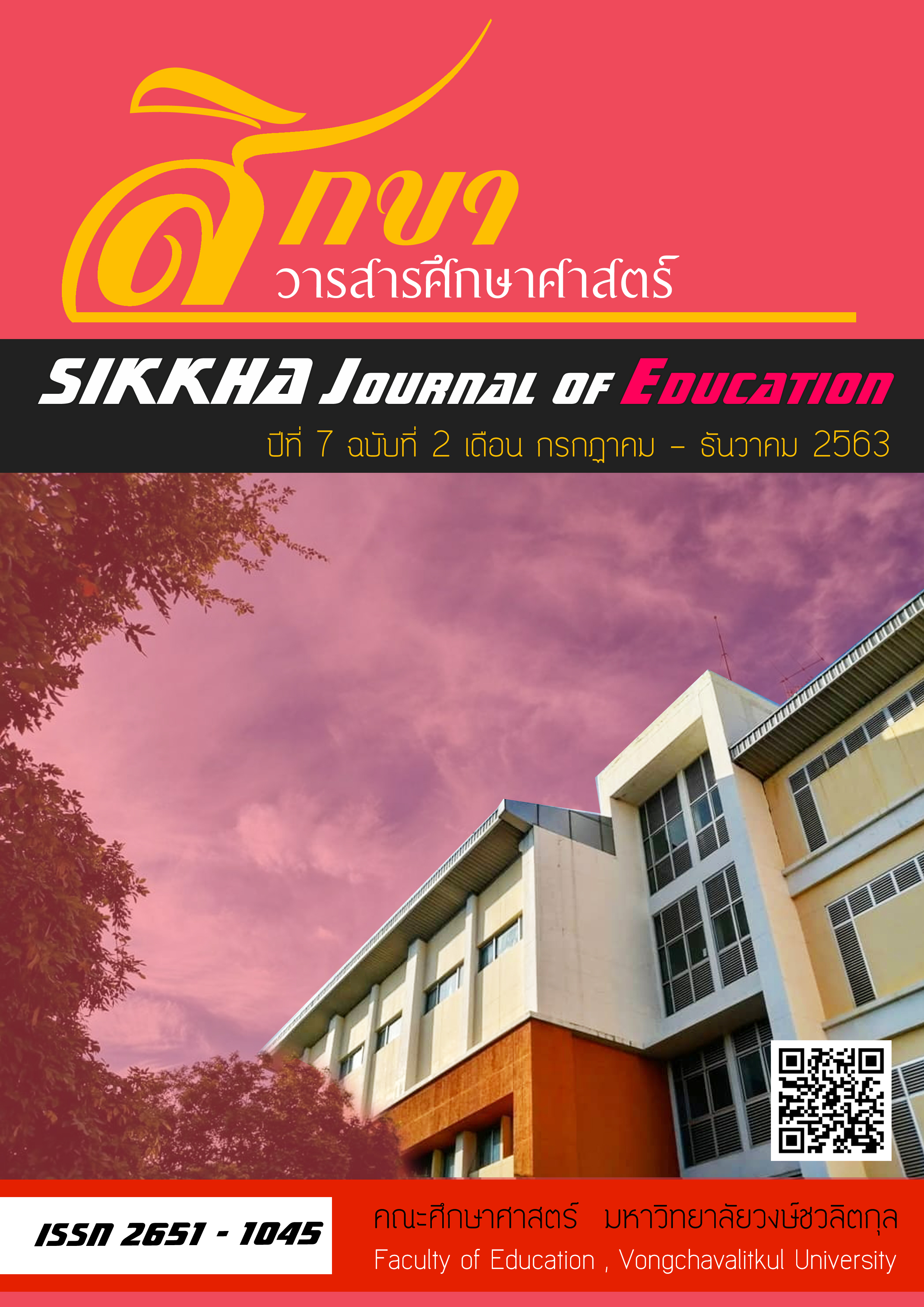Problems in Using English Language of Business English Students at Roi Et Rajabhat University: A Student Perspective
คำสำคัญ:
problems in using English language, students’ perspectiveบทคัดย่อ
This study aimed to 1) identifying the problems in using English language of Business English major students at Roi Et Rajabhat University and 2) compare the problems in using English language amongst Business English major students in all four years based on students’ perceptions in order to help teachers to revise and develop proper English courses for the students. The participants were all 123 Business English major students who were studying in the second semester of the Academic Year 2019. There were 17 first-year students, 37 second–year students, 40 third-year students, and 29 fourth-year students participated in this study selected by purposive sampling method. The research instrument was questionnaire on students’ problems in using English language skills; speaking, listening, reading, and writing, respectively. The Index of Item-Objective Congruence (IOC) of the instrument was within 0.60 - 1.00. The reliability of the questionnaire was 0.927. Means and standard deviation and Analysis of variance (ANOVA) were used to analyze collected data. The results of the study revealed that all students encountered the problems in using English language at the moderate level in speaking, listening, reading, and writing. In relation to each individual language skill, speaking was reported the highest level perceived by the students and the skill with the lowest level is writing. However, there was no significant difference in using English language skills amongst students in all four years. The findings suggested that curriculum revision and program evaluation including classroom interactive activities for the improvement of students’ speaking ability should be conducted.เอกสารอ้างอิง
Aunruen, R. (2005). Needs analysis of English for travel agents in Chiang Mai (Research report). Bangkok: Kasetsart University.
Basturkmen, H. (1998). Refining procedures: A needs analysis project at Kuwait university. English Teaching Forum, 36(4), 2-9.
Berwick, R. (1989). Needs Assessment in Language Programming: From Theory to Practice. In Johnson, R. K. (Ed.), The Second Language Curriculum (pp. 48-62). Cambridge: Cambridge University Press.
Chenaksara, P. (2005). Needs Analysis for English Communication Skills of Thai Airways International Cabin Crew (Master, s thesis). Kasetsart University, Bongkok.
Chuanchaisit, S. & Prapphal, K. (2009). A Study of English Communication Strategies of Thai University Students. MANUSYA: Journal of Humanities, 17, 100-126.
Department of Education. (2020). English Proficiency of Pupils with English as an Additional Language. Retrieved from https://assets.publishing.service.gov.uk/government/uploads/system/uploads/attachment_data/file/868209/English_proficiency_of_EAL_pupils.pdf
Hawkey, R. (1980). Syllabus Design for Specific Purposes. ELT Documents Special. Projects in Materials Design. London: The British Council.
Hutchinson, T., & Water, A. (1987). English for specific purposes: A learning-centered approach. Cambridge: Cambridge University Press.
Jeff, C. B.R. (2019). The Most Difficult Basic Skill Faced by Learners of English in First Year Undergraduate
Classes at UEA/Bukavu, DR Congo. Creative Education, 10, 464-474.
Kara, E., Ayaz, A. D., & Dündar, T. (2017). Challenges in EFL Speaking Classes in Turkish Context. European
Journal of Language and Literature Studies, 8(1), 66-74.
Knox, S. (1997). Development and current use of the Knox Preschool Play Scale. In Parham, L. D., & Fazio,
L. S. (Eds.), Play in Occupational Therapy for Children (pp. 35–51). St. Louis, MO: Mosby Year Book.
Noom-ura, S. (2013). English-Teaching Problems in Thailand and Thai Teachers’ Professional Development Needs (Research report). English Language Teaching, 6(11), 139-147.
Nunan, D. (2003). Practical English Language Teaching. New York: Mc Graw Hill.
Pawapatcharaudom, R. (2007). An Investigation of Thai Students’ English Language Problems and Their Learning Strategies in the International Program at Mahidol University (Master’s thesis). King Mongkut’s Institute of Technology North, Bangkok.
Razika, B. (2017). The Role of Needs Analysis in ESP Course Design Case of master one students of Finance and International Trade Year Students at Biskra University (Master’s thesis). Algeria. University of Mohamed Khider Biskra.
Richterich, R. & Chancerel, J.J. (1987). Identifying the needs of adults learning a foreign language. Oxford: Prentice Hall.
Somdee, M. & Suppasetseree, S. (2013). Developing English Speaking Skills of Thai Undergraduate Students by Digital Storytelling through Websites. Retrieved from http://www.litu.tu.ac.th/journal/FLLTCP/Proceeding/166.pdf
Suppasetseree, S. (2005). The Development of an Internet-Based Instructional System for Teaching Remedial English for First-Year University Students (Doctoral’s thesis). Suranaree University of Technology, Nakhonratchasima.
Tangkijmongkol, C. & Wasanasomsithi, P. (2013). An Analysis of English Language Children in Slum Area in
Bankok Metropolis. PASAA: a journal of language teaching and learning. 46(14).
Warawudhi, R. (2013). Problem Analysis of English Major Undergraduate Students on Internship: A Case Study of Burapha University (Research report). Proceedings of the Asian Conference on Education 2013, (1-13). Osaka, Japan.
ดาวน์โหลด
เผยแพร่แล้ว
รูปแบบการอ้างอิง
ฉบับ
ประเภทบทความ
สัญญาอนุญาต
ลิขสิทธิ์ (c) 2020 สิกขา วารสารศึกษาศาสตร์

อนุญาตภายใต้เงื่อนไข Creative Commons Attribution-NonCommercial-NoDerivatives 4.0 International License.



